人教版九年级英语第六单元知识点复习总结
人教版九年级英语Unit6知识点总结
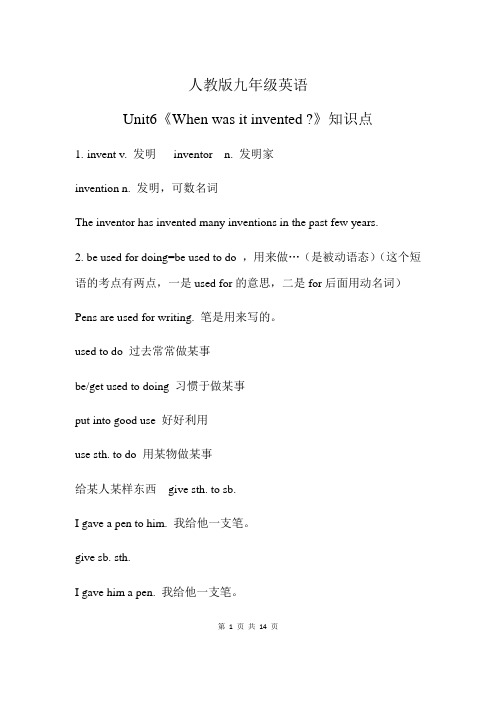
人教版九年级英语Unit6《When was it invented ?》知识点1.invent v. 发明inventor n. 发明家invention n. 发明,可数名词The inventor has invented many inventions in the past few years.2. be used for doing=be used to do ,用来做…(是被动语态)(这个短语的考点有两点,一是used for的意思,二是for后面用动名词)Pens are used for writing. 笔是用来写的。
used to do 过去常常做某事be/get used to doing 习惯于做某事put into good use 好好利用use sth. to do 用某物做某事给某人某样东西give sth. to sb.I gave a pen to him. 我给他一支笔。
give sb. sth.I gave him a pen. 我给他一支笔。
第 1 页共14 页pass/offer /send/show/write/bring/sell/lend/serve/ tobuy/cook/make/get/sing/prepare for4. all day 整天all evening/night the whole day5. salty adj. 咸的salt n. 盐sour/sweet/bitter/hot/salty酸甜苦辣咸6. by mistake 错误地(犯错是:make mistakes=make a mistake,这些常见的短语大家务必要掌握)I took the umbrella by mistake. 我不小心拿错了雨伞。
7. by accident/chance 意外,偶然(常见短语,考的最多的是它的意思)I met her by accident at bus stop.我在公共汽车站意外地见到了她。
人教版九年级英语unit6知识要点总结
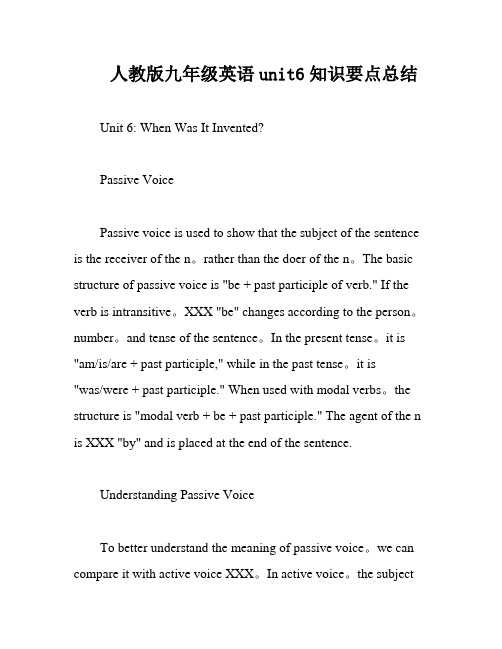
人教版九年级英语unit6知识要点总结Unit 6: When Was It Invented?Passive VoicePassive voice is used to show that the subject of the sentence is the receiver of the n。
rather than the doer of the n。
The basic structure of passive voice is "be + past participle of verb." If the verb is intransitive。
XXX "be" changes according to the person。
number。
and tense of the sentence。
In the present tense。
it is "am/is/are + past participle," while in the past tense。
it is"was/were + past participle." When used with modal verbs。
the structure is "modal verb + be + past participle." The agent of the n is XXX "by" and is placed at the end of the sentence.Understanding Passive VoiceTo better understand the meaning of passive voice。
we can compare it with active voice XXX。
In active voice。
人教版英语初三第六单元知识点总结
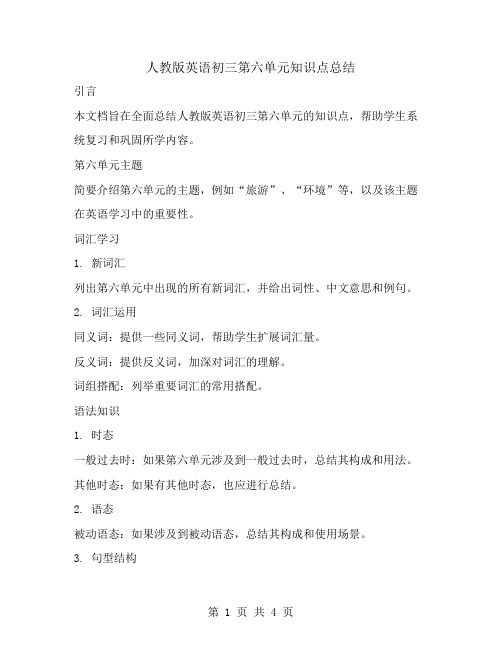
人教版英语初三第六单元知识点总结引言本文档旨在全面总结人教版英语初三第六单元的知识点,帮助学生系统复习和巩固所学内容。
第六单元主题简要介绍第六单元的主题,例如“旅游”、“环境”等,以及该主题在英语学习中的重要性。
词汇学习1. 新词汇列出第六单元中出现的所有新词汇,并给出词性、中文意思和例句。
2. 词汇运用同义词:提供一些同义词,帮助学生扩展词汇量。
反义词:提供反义词,加深对词汇的理解。
词组搭配:列举重要词汇的常用搭配。
语法知识1. 时态一般过去时:如果第六单元涉及到一般过去时,总结其构成和用法。
其他时态:如果有其他时态,也应进行总结。
2. 语态被动语态:如果涉及到被动语态,总结其构成和使用场景。
3. 句型结构简单句:总结简单句的基本结构。
并列句:介绍并列句的构成和使用。
复合句:详细讲解复合句的类型和连接词的使用。
4. 语法点宾语从句:如果单元中有宾语从句,总结其用法。
定语从句:介绍定语从句的构成和用法。
状语从句:总结状语从句的种类和使用。
阅读理解1. 阅读技巧快速阅读:介绍快速阅读技巧,如扫读和略读。
精读:讲解如何进行深入理解和分析。
2. 文章结构开头:分析文章开头的常见方式。
主体:总结主体段落的结构和特点。
结尾:讲解如何写出有力的结尾。
3. 题型分析主旨大意题:介绍如何解答主旨大意题。
细节理解题:讲解细节理解题的解题技巧。
推理判断题:总结推理判断题的答题方法。
写作技巧1. 写作结构引言:介绍如何写好文章的引言部分。
正文:讲解正文的段落结构和论点展开。
结尾:总结如何写出有力的结尾。
2. 写作技巧词汇运用:强调准确使用词汇的重要性。
句型变化:介绍如何使用不同的句型使文章更丰富。
逻辑连贯:讲解如何使文章内容逻辑连贯。
听力训练1. 听力技巧预测:介绍如何根据上下文进行预测。
捕捉关键信息:讲解如何快速捕捉对话或文章中的关键信息。
2. 听力题型选择题:总结选择题的解题策略。
填空题:介绍填空题的答题技巧。
口语表达1. 发音练习元音:总结元音的正确发音方法。
人教版九年级全一册英语Unit6重点语法知识点总结

人教版九年级全一册英语Unit6重点语法知识点总结Unit 6 When was it invented?Section A(1a~2d)_必记单词ⅢⅢ1. heel n.鞋跟;足跟【例句】His heel is raw because his shoe does not fit well. 因鞋子不合适,他的脚后跟擦破皮了。
2. scoop n. 勺;铲子【例句】He used a scoop to scrve the ice cream. 他用铲子来吃冰激凌。
3. electricity n.电;电能【例句】While I was cooking supper, the electricity went off.我正在做晚饭时停电了。
【联想】electrical adj.电的,与电有关的4. style n.样式;款式【例句】The style of this skirt is just in season.这条裙子的款式正当时令。
【搭配】out of style 过时的|| in style 流行;时髦地5. project n.项目;工程【例句】The project is proceeding as planned. 工程正在按计划进行。
【联想】projection n.设计;规划;放映6. pleasure n.高兴;愉快【例句】He didn't show any pleasure when I offered to go withhim.我提出和他一起去,他并没有表示出高兴的样子。
【搭配】pleasure in... 以……为荣‖with pleasure 乐意效劳It's a /my pleasure.不客气。
【注意】pleasure 多用作不可数名词,当做“快乐的事,乐事”解时用作可数名词。
7. zipper n.(=zip) 拉链;拉【例句】The zipper is red.这条拉链是红色的。
人教版9年级英语第六单元知识点归纳

精心整理九年级上册第6单元考情分析:本单元还是在讲被动语态,主要在单选中与动词时态混合考查,在写作与阅读中也常会用到。
A.不知道或没有必要说明动作的执行者是谁时.We haven’t been told about it.没人通知我们这件事B.强调动作的承受者(这时可带由by引起的短语)The book was written by Mo Yan.C.不愿说出动作的执行者是谁He was asked to give a speech about how to study English well.3.被动语态的注意事项:A. there be 结构没有被动语态B.主句中宾语是反身代词的没有被动语态7.fall into落入,陷入。
比较容易搞混淆的还有:fall down摔倒,fall off掉下,fall asleep入睡8.辨析:remain是动词,保持不变/仍然是;remind动词,提醒,remind to do sth,remind···of。
9.辨析:【了解】家;translation名词,翻译15.all of a sudden突然,猛地=suddenly16.by mistake无意中,错误地17.much-loved 深受喜爱的,复合形容词18.divide···into···把····分成·····19.stop···from···阻止····做····20.dream of/about 梦想···向往···· (of/about是介词,后面的动词用-ing 形式)21.look up to 倾佩/仰慕/抬起头看练习:(15年上海中考)以“I want to invent ______"为题,写一篇不少于60个词的短文,标点符号不占格参考词汇:1.It can be used to ...with the help of our robot doctors,?you can talk to your personal doctor one to one whenever you want.In short, family doctor robots can?make great contribution to?our society.精彩亮点分析:亮点一:全文巧用“first, furthermore, in short”等连接词,把家庭机器人医生的好处写的非常清晰,让阅卷老师一目了然。
Unit6 知识复习总结 人教版九年级全册英语

Unit6 知识复习总结一)单词1)鞋跟;足跟n. 2)勺n. 3)样式n. 4)项目;工程n.5)高兴;愉快n. 6)每日的;日常的adj. 7)网站n. 8) 列表v. 清单n.9)提到;说到v. 10)几乎;差不多adv.11)气味n. 发出⋯⋯气味;闻到v.12)疑惑;疑问n.怀疑v. 13)翻译v. 14)锁上;锁住v. 15)突然(的)adj. 16)器械;仪器;工具n. 17)分开;分散v.18)目的;目标n .19)英雄n.;20) 脆的adj. 21)酸的adj.二)词组1)偶然;意外地2) 发生;出现3) 毫无疑问;的确4)突然;猛地5) 错误地;无意中6) 把⋯⋯分开7)钦佩;仰慕8)少于9)把…翻译成10)最终11)鼓励某人做某事12)导致13)不但…而且14)落入,跌入三)语法1)thousand 数词“千”几千“基数词+thousand”“成千上万”thousands of(有加s)2)3)4)一般过去式的被动语态 was/were +及物动词的过去分词 The desk was made by my father.训练巩固:一.根据句意和提示完成句子。
1) This kind of cakes _____ ________ ( 尝起来很好)。
I would like _____ _______ (另一个)。
2)Be careful, or you will _____ _____ (掉入) the river.3) _____ _____ ( 依据) an ancient Chinese legend, tea was discovered by an emperor.4)After the fire nothing ________(剩下)in the house.5). My grandparents often goes shopping with a b________ (篮子).6). I only have some (饼干) and a glass of milk every morning.7). The students were asked to (翻译) the story into English.二、选择题1.Old people must be looked after well and ___ politely.A. speak toB. spokenC. speakD. spoken to2. Miss Gao an old man while she was riding to school.A. knocked intoB. knocked ofC. knocked byD. knocked on3. Of all the students, Linda draws carefully.A. very B much C. more D. most4. I’d like to have a radio so that I could listen to musicA .all the dayB .all dayC .all of day D. of all day5.The sun from the east every morning.A. risenB. raisesC. risesD. raise三、完成句子:1.我认为电话的发明要早于汽车的发明。
人教版9年级英语第六单元知识点归纳
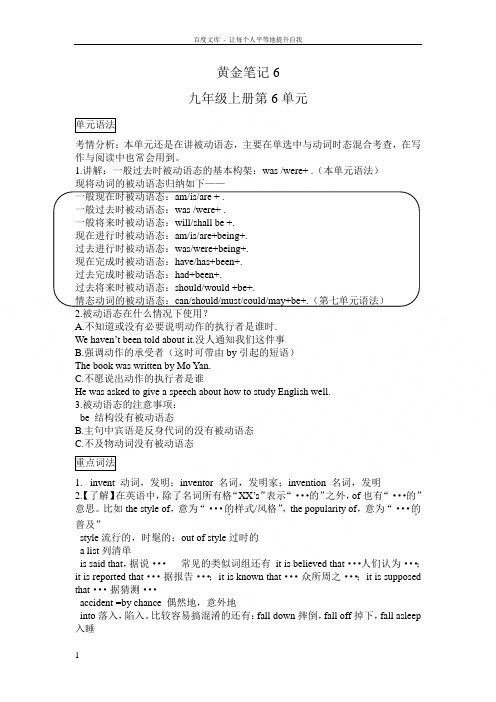
黄金笔记6九年级上册第6单元单元语法考情分析:本单元还是在讲被动语态,主要在单选中与动词时态混合考查,在写作与阅读中也常会用到。
1.讲解:一般过去时被动语态的基本构架:was /were+ .(本单元语法)现将动词的被动语态归纳如下——一般现在时被动语态:am/is/are + .一般过去时被动语态:was /were+ .一般将来时被动语态:will/shall be +.现在进行时被动语态:am/is/are+being+.过去进行时被动语态:was/were+being+.现在完成时被动语态:have/has+been+.过去完成时被动语态:had+been+.过去将来时被动语态:should/would +be+.情态动词的被动语态:can/should/must/could/may+be+.(第七单元语法)2.被动语态在什么情况下使用?A.不知道或没有必要说明动作的执行者是谁时.We haven’t been told about it.没人通知我们这件事B.强调动作的承受者(这时可带由by引起的短语)The book was written by Mo Yan.C.不愿说出动作的执行者是谁He was asked to give a speech about how to study English well.3.被动语态的注意事项:be 结构没有被动语态B.主句中宾语是反身代词的没有被动语态C.不及物动词没有被动语态重点词法1.invent 动词,发明;inventor 名词,发明家;invention 名词,发明2.【了解】在英语中,除了名词所有格“XX’s”表示“···的”之外,of也有“···的”意思。
比如the style of,意为“···的.样式/风格”,the popularity of,意为“···的.普及”style流行的,时髦的;out of style过时的a list列清单is said that,据说···常见的类似词组还有it is believed that···人们认为···;it is reported that···据报告···;it is known that···众所周之···;it is supposed that···据猜测···accident =by chance 偶然地,意外地into落入,陷入。
人教版九年级英语unit6知识点总结
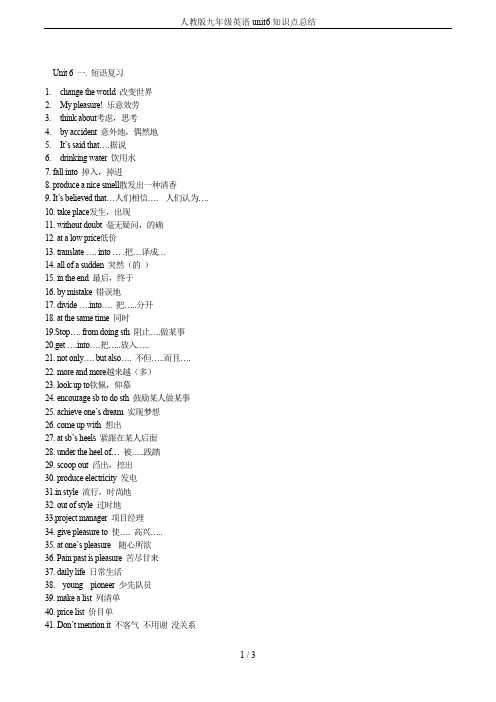
Unit 6 一. 短语复习1.change the world 改变世界2.My pleasure! 乐意效劳3.think about考虑,思考4.by accident 意外地,偶然地5.It’s said that….据说6.drinking water 饮用水7. fall into 掉入,掉进8. produce a nice smell散发出一种清香9. It’s believed that…人们相信…. 人们认为….10. take place发生,出现11. without doubt 毫无疑问,的确12. at a low price低价13. translate …. into … .把…译成…14. all of a sudden 突然(的)15. in the end 最后,终于16. by mistake 错误地17. divide ….into…. 把…..分开18. at the same time 同时19.Stop…. from doing sth 阻止….做某事20.get ….into….把…..放入…..21. not only…. but also…. 不但…..而且….22. more and more越来越(多)23. look up to钦佩,仰慕24. encourage sb to do sth 鼓励某人做某事25. achieve one’s dream 实现梦想26. come up with 想出27. at sb’s heels 紧跟在某人后面28. under the heel of… 被…..践踏29. scoop out 舀出,挖出30. produce electricity 发电31.in style 流行,时尚地32. out of style 过时地33.project manager 项目经理34. give pleasure to 使…. 高兴…..35. at one’s pleasure 随心所欲36. Pain past is pleasure 苦尽甘来37. daily life 日常生活38. young pioneer 少先队员39. make a list 列清单40. price list 价目单41. Don’t mention it 不客气不用谢没关系42.boil up 煮沸烧开43.remain calm 保持冷静44. sense of smell 嗅觉45. in doubt 可疑的不能肯定的46. sudden death 猝死47. spread to other countries 传播到其他国家48. a Chinese ruler 一位中国统治者49. over an open fire 在一堆明火上50. make tea 沏茶51. the national drink 国民饮料52. the popularity of tea 茶叶的普及53. go out alone 单独外出54. work on the invention of the telephone = invent the telephone 发明电话55.attract customers 吸引顾客56. Don’t put all your eggs in one basket 不要孤注一掷57. folk hero 民间英雄58. a much-loved and active sport 一项深受喜爱和活跃的运动59.in history 在历史上60. work together 合作61. lead to 把… 带到…. 导致62. more than 多于超出63.the personal computer 私人电脑64. take an active part in 积极参加二。
- 1、下载文档前请自行甄别文档内容的完整性,平台不提供额外的编辑、内容补充、找答案等附加服务。
- 2、"仅部分预览"的文档,不可在线预览部分如存在完整性等问题,可反馈申请退款(可完整预览的文档不适用该条件!)。
- 3、如文档侵犯您的权益,请联系客服反馈,我们会尽快为您处理(人工客服工作时间:9:00-18:30)。
人教版九年级英语第六单元知识点总结2. please v 取悦;请;→ pleasure n 愉快→pleased adj.(人)高兴的→pleasant adj.(物)令人愉快的(1)With pleasure.我的荣幸(对方提出要求,答应对方的用语。
未提供帮助前。
)(It is )a pleasure/(It is )my pleasure.我的荣幸(是对方致谢时的答语。
提供帮助后。
)--Can you help me carry the box.--With pleasure./I would love to./No problem.--Thank you--(It is )a pleasure/(It is )my pleasure.(2)be pleased to do sth 愉快做某事 be pleased with sth 对….满意It’s my _____________(please) to help you.他对这辆车很满意。
_____________________________.(3)What pleased you best?3.Don’t mention it.(1)--I am sorry.-- Don’t mention it.(2)—Thank you--Don’t mention it.4.by accident/by chanceby mistakeon purpose/by design5.nearly/almost几乎,接近。
常可替换。
(1)但有very pretty not修饰时或者具体数字前常用nearly.习语 Not nearly远非,完全不 very(pretty) nearly几乎(2)almost可用于none no never nobody nothing等否定词之前,但nearly不可。
6.take place(计划,必然) /happen (偶然)均无被动。
happen/ take placehappen v “发生”没有被动语态,强调某事发生的偶然性a. sth. happen to sb. 某事发生在某人身上What happened to you?=What was wrong with him?b. sb. happen to do sth. 某人碰巧做某事C. It happened that…碰巧(2)take place 发生,没有被动语态,指事情有计划有安排地发生take the place of 取代……位置The sports meeting took place in our school last week.The story _______in a faraway small village. What ______ to the farmer?7.without doubt=There is no doubt8.all of a sudden=suddenly9.above/below(不垂直) over/under(垂直)10.translate..into..11.call sb=telephone sb=phone sb=give sb a call=ring sb up12.not only…but (also) 就近原则13.invent v 发明→inventor n 发明家→ invention n 发明Edison , a great ________, _________over 1’000__________ all his life.(invent) discover v 发现(指发现客观存在的事物invent v 发明(指创造“发明”出来新的东西)Columbus discovered America in1492. We soon discovered the truth.14. use (1) use v 用,使用→ useful adj. 有用的 (2) use up(有被动) = run out (不及物,无被动,接名词需加of)用完,用尽 We used up the water./The water was usedup by us. We run out of the water./The water run out.(3) use sth to do sth 使用某物做某事 be used for doing=be used to do sth 被用来做某事 (4)used to do sth 过去常常做某事 (5)be used to doing sth 习惯于做某事(6)be used by +动作执行者被…..使用 (7)be used as+名词被用作….(8)be useful to 对……有用Tables were used___desks when we were young. A. by B. as C. to15. such a/an + 形容词 + 可数名词单数 = so + 形容词 + a/an + 可数名词单数such + 形容词 + 可数名词复数; such + 形容词 + 不可数名词so many/few + 可数名词复数; so much/little + 不可数名词都可和“that”连用,意思基本一样So that +句子以便,以致于用such或so填空。
(1)They made _____ much noise that our teacher got very angry.(2)Have you seen _____ an interesting film?(3) ____ a little boy can only eat _____ little rice.(4)Our teacher teaches us ______ well that we are all thankful to him.(5)I took a taxi ______ that I could catch the train.(6) He left ______ hurriedly that he forgot to lock the door.16. not … until …直到……才……(谓语动词可用瞬间动词)(1)强调动作直到until 后的时间才发生。
Not 通常与首句中的be动词、助动词或情态动词连用。
否定意思是"直至某时才做某事"。
动词为延续性或非延续性(常见)都可以______________________________________ 昨天晚上她直到六点才到家。
(2)until 直到......时 (谓语动词只能用延续性动词)肯定形式表示的意思是"做某事直至某时",动词必须是延续性的I slept until midnight. 我一直睡到半夜时醒了。
17. look up to钦佩;仰慕(反义词组)→ look down on/ upon 看不起18.remain +adj保持 = stay+ adj19.It’s said thatIt’s reported thatIt’s believed thatIt’s well-known thatIt’s supposed that20.a Chinese ruler called Shen Nong= a Chinese ruler named Shen Nong21.sometime 某个时候 some time一段时间 sometimes 有时 some times几倍;几次22.hundred thousand million billion等词前如果有数字时,这些词不加s如果这些词前无数字而后有of,这些词要加s23.around=about大约24.more than=over 大于,多于less than 少于25.see/treat/regard……as 视…..为…..as 作为/因为26.the saint of sth …的圣人27.sb mentioned某人提到…28.tea plant=tea tree29.spread…to sp30. 询问价格的句型是“What is the price of +名词?=How much is/ are +名词?”。
How much is the bike? = What’s the price of the bike?【拓展】price n 价格,用形容词low或high来修饰价格,通常与介词at连用。
( )The price of the pen is not ________ for him. He is poorA. Cheap B .expensive C. high D. low31.make+宾语+ adj make the classroom cleanmake+宾语+n make him our monitormake+宾语+do make us laugh32.adj+enough enough + n33. end n/v 结尾— ending n 结尾(1)in the end = at last = finally 最后(后不接of短语)(2)at the end of…在…尽头(反)at the beginning of 在…开始(后接时间或地点名词)(3)end up doing sth 终止做某事(4) end up with sth 以…而结束最终,他结束了弹琴。
______________________________________34. think of=come up with35.stop/prevent/keep/protect…..from(1) prevent/stop/keep... from doing..表示“阻止某人做某事”例如:We must prevent the water from being polluted.What stopped him from coming here.(2) protect…from/against…表示“保护……免受……”且from不可略. 例如:We should protect our skin from being burnt in summer.Protect children from violence注意(1) stop/prevent…from…中使用主动语态时,可省略介词from,而词组keep…from的from不可省略.但在被动语态中from均不可省略.(2) From后跟动词主动用doing被动用being done(3) Keep sb doing sth使某人一直干某事The boss kept them working twelve hours a day(4) stop doing sth 停止做某事 Please stop speaking.请停止讲话stop to do sth 停下来去做另外一件事 Please stop to talk.请停下来讲话36.rise/raise“上升”raise是及物动词,后面必须有宾语,就是“某人把某物举起来”。
